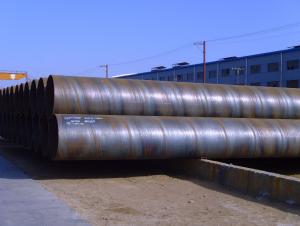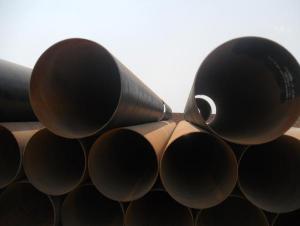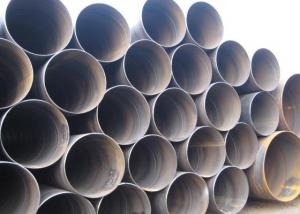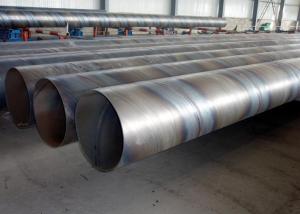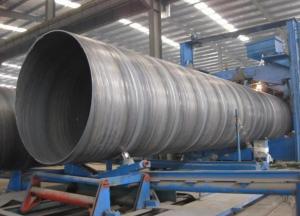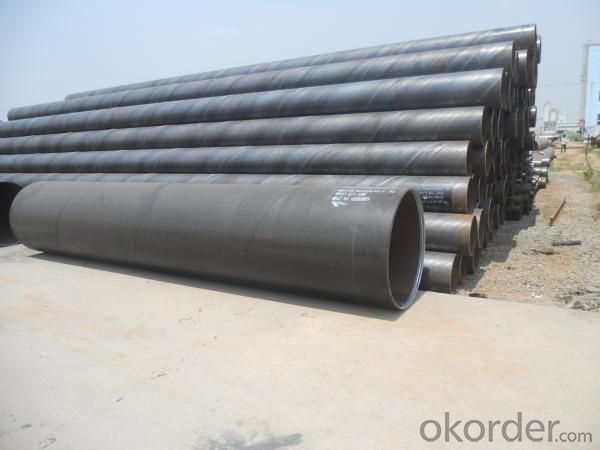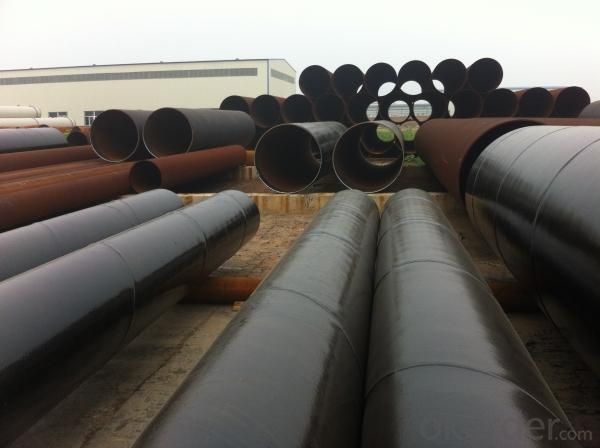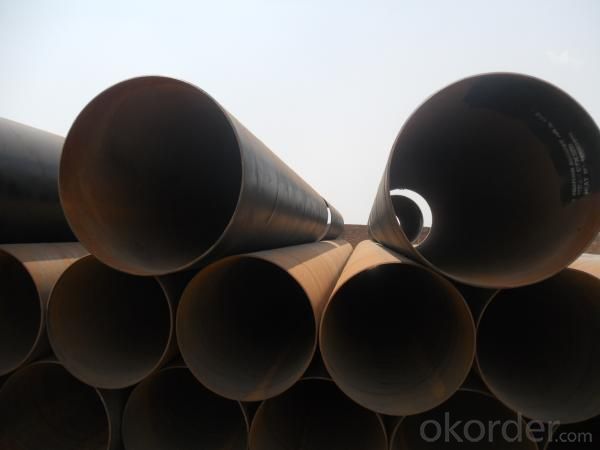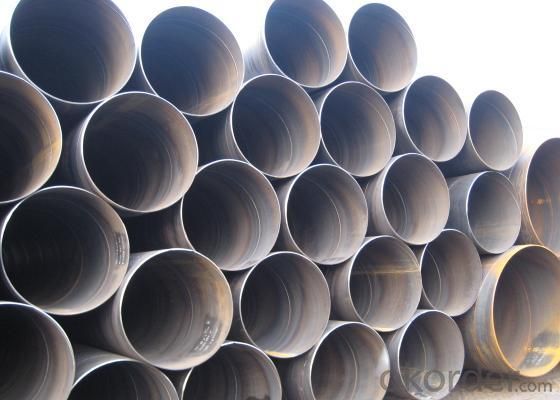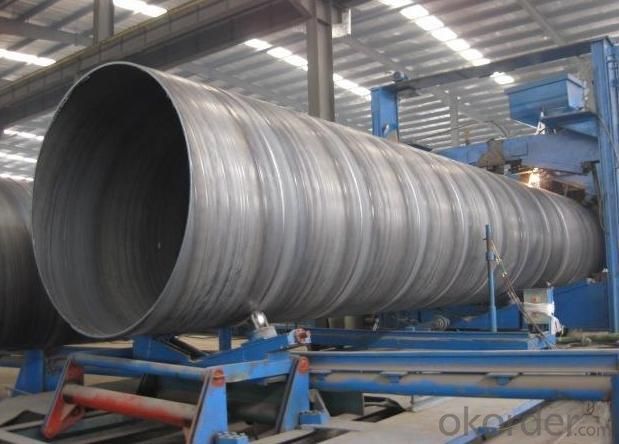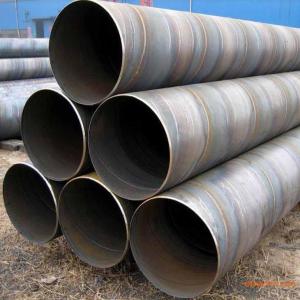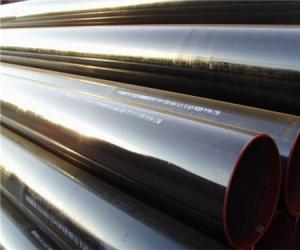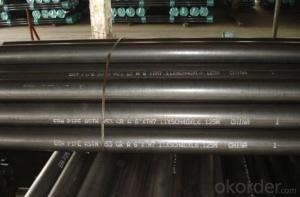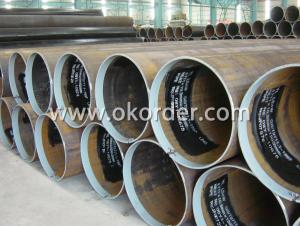High Quality API 5L SSAW Welded Steel Pipes For Oil And Natural Gas Industries
- Loading Port:
- China Main Port
- Payment Terms:
- TT or L/C
- Min Order Qty:
- 5 m.t. m.t.
- Supply Capability:
- Based On Order m.t./month
OKorder Service Pledge
OKorder Financial Service
You Might Also Like
High Quality API 5L SSAW Welded Steel Pipes For Oil And Natural Gas Industries Products Type Of High Quality API 5L SSAW Welded Steel Pipes For Oil And Natural Gas Industries: API 5L LSAW Welded Steel Pipes Longitudinal Submerged Arc Welded (LSAW) Steel Pipe API 5L SSAW Welded Steel Pipes Spiral Submerged Arc Welded (SSAW) Steel Pipe API 5L ERW Welded Steel Pipes Electric Resistance Arc Welded (ERW) Steel Pipe Specifications Of High Quality API 5L SSAW Welded Steel Pipes For Oil And Natural Gas Industries: Standard: API SPEC 5L, API SPEC 5CT, ASTM A53, GB/T9700.1 Main Steel Tube Grade: API SPEC 5L: B, X42, X46, X52, X56, X60, X65 API SPEC 5CT: J55, K55, N80, L80-1 ASTM A53: A, B, C GB/T9700.1:L242、L290、L320、L360、L390、L415、L450 Sizes Of High Quality API 5L SSAW Welded Steel Pipes For Oil And Natural Gas Industries: *Remark: Besides below sizes, we also can arrange production based on requirement of customers OD WT Nominal Pipe size Inches OD MM 10 20 30 STD 40 60 XS 80 12 323.90 6.35 8.38 9.53 10.31 14.27 12.70 17.48 14 355.60 6.35 7.92 9.53 9.53 11.13 15.09 12.70 19.05 16 406.40 6.35 7.92 9.53 9.53 12.7 16.66 12.70 21.44 18 457.00 6.35 7.92 11.13 9.53 14.27 19.05 12.70 23.88 20 508.00 6.35 9.53 12.7 9.53 15.09 20.62 12.70 26.19 22 559.00 6.35 9.53 12.7 9.53 22.23 12.70 28.58 24 610.00 6.35 9.53 14.27 9.53 17.48 24.61 12.70 30.96 26 660.00 7.92 12.70 9.53 12.70 28 711.00 7.92 12.70 15.88 9.53 12.70 30 762.00 7.92 12.70 15.88 9.53 12.70 32 813.00 7.92 12.70 15.88 9.53 17.48 12.70 34 864.00 7.92 12.70 15.88 9.53 17.48 12.70 36 914.00 7.92 12.70 15.88 9.53 19.05 12.70 38 965.00 9.53 12.70 40 1016.00 9.53 12.70 42 1067.00 9.53 12.70 44 1118.00 9.53 12.70 46 1168.00 9.53 12.70 48 1219.00 9.53 12.70 Mechanical Properties Of High Quality API 5L SSAW Welded Steel Pipes For Oil And Natural Gas Industries: Standard Grade (MPa) (MPa) Yield strength Tensile Strength API SPEC 5L PSL1 B ≥241 ≥414 ×42 ≥290 ≥414 ×46 ≥317 ≥434 ×52 ≥359 ≥455 ×56 ≥386 ≥490 ×60 ≥414 ≥517 ×65 ≥448 ≥531 ×70 ≥483 ≥565 PSL2 Min Max Min Max B 241 448 441 758 ×42 290 496 414 758 ×46 317 524 434 758 ×52 359 531 455 758 ×56 386 544 490 758 ×60 414 565 517 758 ×65 448 600 531 758 ×70 483 621 565 758 Chemical Composition Of High Quality API 5L SSAW Welded Steel Pipes For Oil And Natural Gas Industries (%) Standard Grade C Mn P S TI CEV Max Max Max Max Max Max API SPEC 5L PSL1 B 0.26 1.2 0.030 0.030 0.04 - ×42 0.26 1.3 0.030 0.030 0.04 ×46,×52,×56,X60 0.26 1.4 0.030 0.030 0.04 X65 0.26 1.45 0.030 0.030 0.06 X70 0.26 1.65 0.030 0.030 0.06 PSL2 B 0.22 1.20 0.025 0.015 0.04 0.43 ×42 0.22 1.30 0.025 0.015 0.04 ×46,×52,×56, X60 0.22 1.40 0.025 0.015 0.04 X65 0.22 1.45 0.025 0.015 0.06 X70 0.22 1.65 0.025 0.015 0.06 Usage/Applications Of High Quality API 5L SSAW Welded Steel Pipes For Oil And Natural Gas Industries: It is widely applied to line pipe in oil and sewage transportation, and it is used in Low pressure liquid and gassy transportation and it is also good Structure pipe in building and bridge field. It also can be used for conveying gas, water and petroleum for oil and natural gas industries Packaging & Delivery Of High Quality API 5L SSAW Welded Steel Pipes For Oil And Natural Gas Industries: Packaging: with anti-rust painting and with plastic caps, or with PVC package, or hot dipped galvanized, or 3 PE coating Delivery: by containers or by bulk vessel 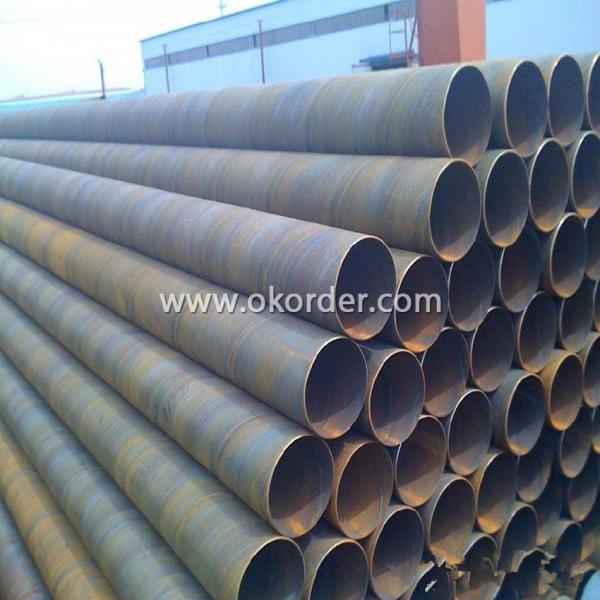
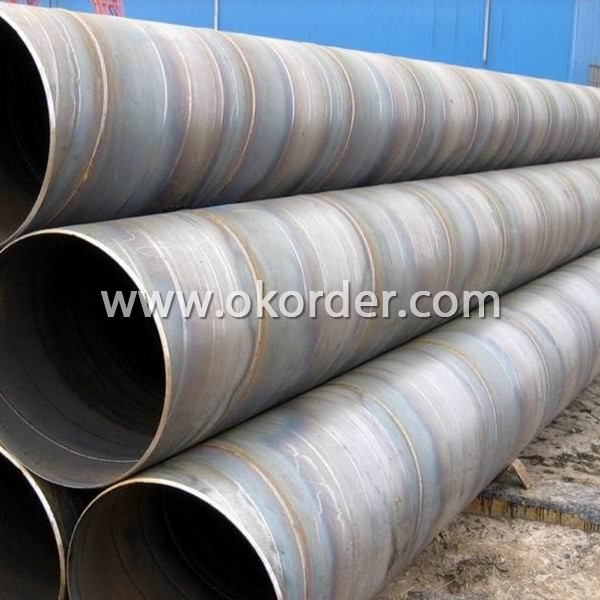
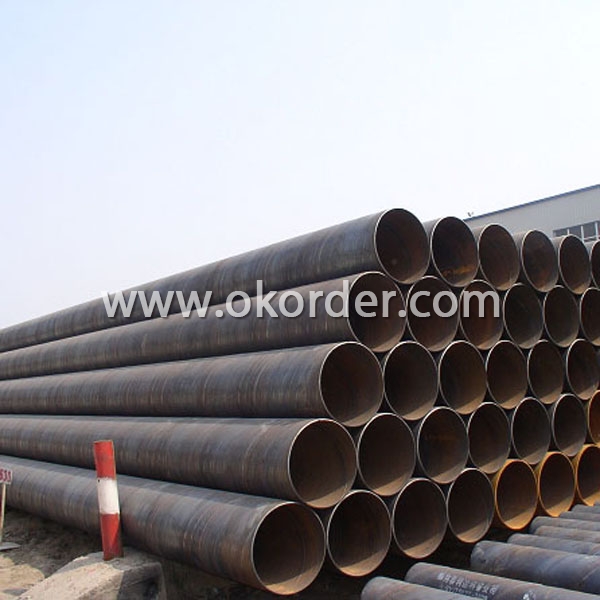
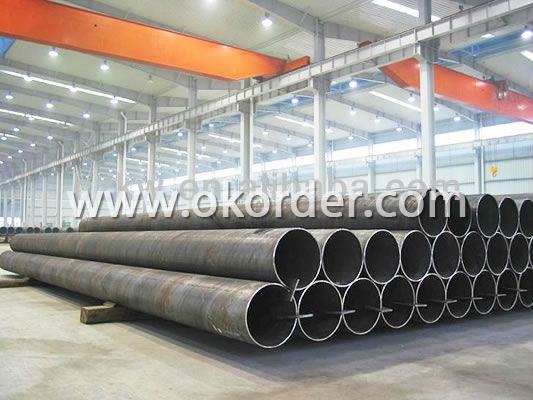
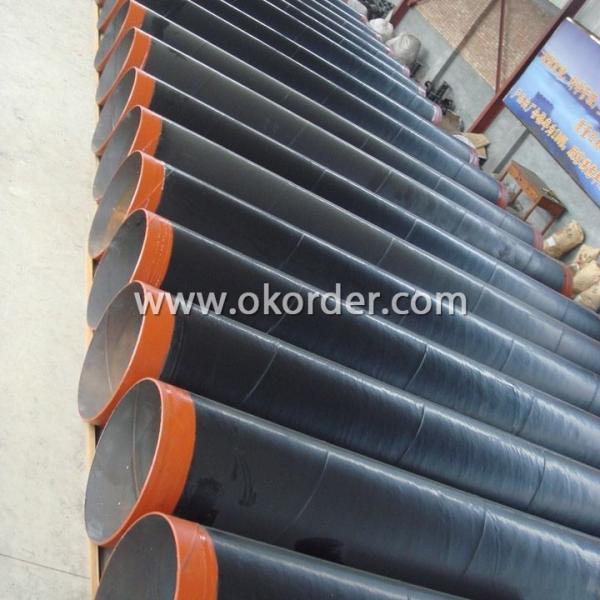
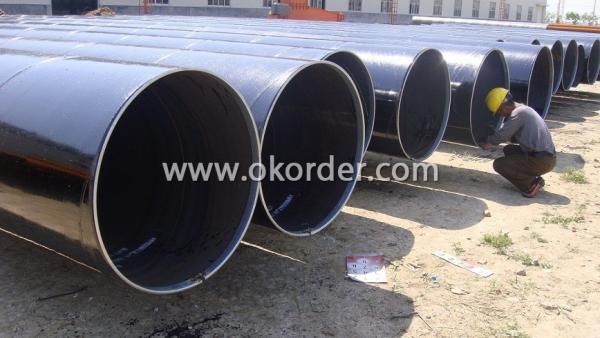
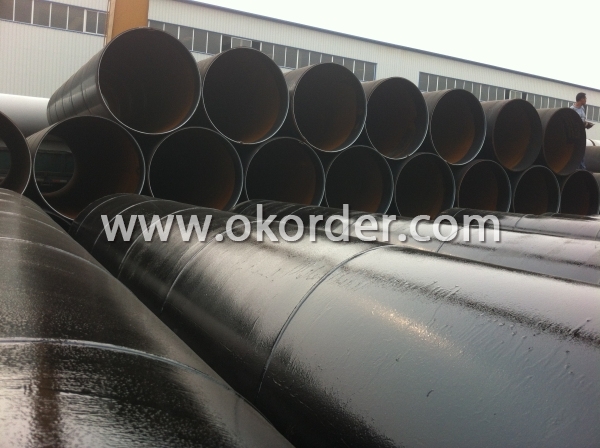
- Q: How are steel pipes used in the food processing industry?
- Steel pipes are commonly used in the food processing industry for various purposes such as transporting liquids, gases, and solids, as well as for conveying hot water, steam, and chemicals. These pipes are known for their durability, corrosion resistance, and ability to withstand high temperatures, making them ideal for applications where strict hygiene and safety standards are essential. Steel pipes are used in food processing plants for tasks like transferring ingredients, transporting processed products, and maintaining a sterile environment through steam cleaning and sanitization processes.
- Q: How do steel pipes perform in extreme weather conditions?
- Steel pipes perform well in extreme weather conditions due to their high strength, durability, and resistance to corrosion. They can withstand extreme temperatures, heavy winds, and harsh climates, making them a reliable choice for various industries and applications.
- Q: How are steel pipes affected by international trade policies?
- Steel pipes can be significantly impacted by international trade policies. These policies can include tariffs, quotas, and other trade barriers that affect the import and export of steel pipes. Changes in trade policies can lead to fluctuations in prices, supply, and demand for steel pipes. Additionally, trade policies can also influence the competitiveness of domestic steel pipe producers in the global market.
- Q: What is the density of steel pipes?
- The density of steel pipes varies depending on the specific grade and composition of the steel used. However, on average, the density of steel pipes is typically around 7.8 grams per cubic centimeter (g/cm³) or 7800 kilograms per cubic meter (kg/m³). It is important to note that this value can vary slightly depending on factors such as the manufacturing process and the specific alloy used in the steel.
- Q: Can steel pipes be used for underground fire hydrants?
- Yes, steel pipes can be used for underground fire hydrants. Steel pipes are commonly used in underground water supply systems, including fire hydrant installations. They are known for their durability, strength, and resistance to corrosion, which makes them suitable for underground applications. Additionally, steel pipes can withstand high water pressures and provide a reliable and long-lasting solution for fire hydrant installations. However, it is essential to ensure that the steel pipes used for underground fire hydrants are properly coated or lined to prevent corrosion and maintain their structural integrity over time. Regular maintenance and inspections should also be conducted to identify and address any potential issues that may arise.
- Q: How are steel pipes used in the construction of stadiums and arenas?
- Steel pipes are commonly used in the construction of stadiums and arenas for various purposes. They are primarily used for the structural framework, supporting the weight of the building and providing stability. Steel pipes are also used for the installation of HVAC systems, electrical wiring, and plumbing, allowing for efficient distribution of utilities throughout the facility. Additionally, steel pipes are utilized for the construction of handrails, fences, and barriers, ensuring safety and security for spectators.
- Q: How are steel pipes classified according to their use?
- Steel pipes are classified according to their use based on factors such as their diameter, wall thickness, and the intended application.
- Q: Can steel pipes be used for conveying solid materials?
- Yes, steel pipes can be used for conveying solid materials. Steel pipes are known for their high strength and durability, making them suitable for transporting solid materials such as ores, grains, or construction materials. They are commonly used in industries such as mining, agriculture, and construction for this purpose.
- Q: How are steel pipes marked for identification?
- Steel pipes are marked for identification through a process called pipe marking. This involves applying labels or markers on the surface of the pipes to provide relevant information about their specifications and characteristics. The markings typically include details such as the pipe's size, grade, material composition, manufacturer's logo or name, and any other relevant codes or standards. These markings are crucial for identification and help ensure that the correct pipes are used for specific applications, as well as for maintenance and repair purposes. Additionally, the markings also aid in quality control and traceability, enabling easy identification and tracking of pipes throughout their lifecycle. Overall, proper identification of steel pipes through clear and durable marking systems is essential for maintaining safety, efficiency, and compliance in various industries where these pipes are utilized.
- Q: What are the different methods of lining steel pipes?
- There are several methods of lining steel pipes, each with its own advantages and uses. Some common methods include: 1. Cement Mortar Lining: This involves the application of a layer of cement mortar on the inner surface of the steel pipe. Cement mortar provides excellent corrosion resistance and smoothness to the pipe, reducing friction and improving flow rates. It is commonly used in water supply systems and sewage treatment plants. 2. Polyethylene (PE) Lining: PE lining involves the insertion of a polyethylene tube into the steel pipe. The tube is usually heat fused or mechanically connected to the steel pipe, creating a seamless and corrosion-resistant lining. PE lining is commonly used in gas transmission and distribution pipelines. 3. Epoxy Lining: Epoxy lining involves the application of an epoxy resin to the inner surface of the steel pipe. Epoxy coatings provide excellent resistance to corrosion, abrasion, and chemicals, making them suitable for various applications such as oil and gas pipelines, water treatment, and industrial processes. 4. Trenchless Pipe Lining: This method is used to rehabilitate existing steel pipes without the need for excavation. It involves the insertion of a liner or resin-coated fabric into the existing pipe, which is then inflated and cured to form a new lining. Trenchless pipe lining is commonly used for sewer and water main rehabilitation. 5. Polyurethane (PU) Lining: PU lining involves spraying or pouring a polyurethane coating onto the inner surface of the steel pipe. Polyurethane linings provide excellent resistance to abrasion, impact, and chemicals, making them suitable for applications in mining, slurry pipelines, and wastewater treatment. These are just a few of the many methods available for lining steel pipes. The choice of lining method depends on factors such as the intended application, the environment, and the desired level of corrosion resistance and durability.
1. Manufacturer Overview
| Location | Tianjin, China |
| Year Established | 2001 |
| Annual Output Value | 500,000Tons |
| Main Markets | Southeast Asia; Middle East; Oceania; Americas; Europe; Africa;etc. |
| Company Certifications | API 5L;API 5CT;ISO9001:2008 GB/T 19001-2008 |
2. Manufacturer Certificates
| a) Certification Name | |
| Range | |
| Reference | |
| Validity Period |
3. Manufacturer Capability
| a) Trade Capacity | |
| Nearest Port | Tianjin;Qingdao |
| Export Percentage | 50% - 60% |
| No.of Employees in Trade Department | 1000-1100 People |
| Language Spoken: | English; Chinese; Spanish |
| b) Factory Information | |
| Factory Size: | Above 150,000 square meters |
| No. of Production Lines | Above 10 |
| Contract Manufacturing | OEM Service Offered; Design Service Offered |
| Product Price Range | Average |
Send your message to us
High Quality API 5L SSAW Welded Steel Pipes For Oil And Natural Gas Industries
- Loading Port:
- China Main Port
- Payment Terms:
- TT or L/C
- Min Order Qty:
- 5 m.t. m.t.
- Supply Capability:
- Based On Order m.t./month
OKorder Service Pledge
OKorder Financial Service
Similar products
Hot products
Hot Searches
Related keywords

